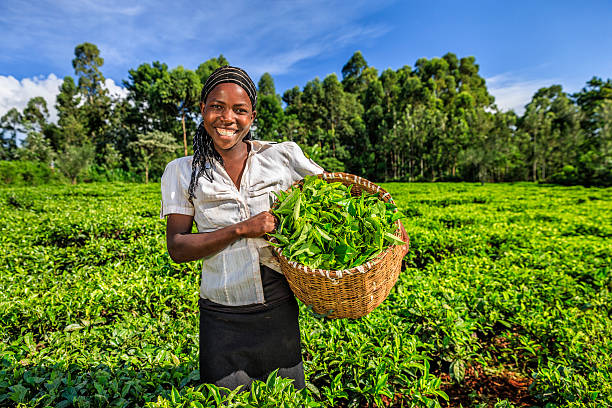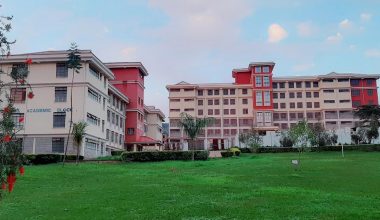Kenya is popularly known as one of Africa’s leading agricultural countries, and its agricultural sector plays a significant role in its economic development.
In response to the importance of agriculture, many schools in Kenya have shifted focus to offering specialized agriculture courses. These courses aim to equip learners with the skills and knowledge necessary to survive in the rapidly growing agricultural industry and take advantage of the numerous opportunities available.
In Kenya, many institutions provide well-detailed agriculture programs for students interested in various aspects of the agricultural sector. These courses are fitted to prepare students for successful careers in agriculture.
This article will provide a detailed guide to the best agriculture courses in Kenya, along with the requirements and fees for each. So, if you are a student or want to add more knowledge, this is the perfect guide to help you decide about your education and future in agriculture.
Table of contents
- What Are Agricultural Courses?
- How Much is an Agriculture Course in Kenya?
- List of the Best Agriculture Courses in Kenya
- Online Agriculture Courses in Kenya
- Introduction to Sustainable Agriculture – Alison
- Diploma in Agriculture and Food Security – Egerton University
- Certificate in Organic Farming – KOAN (Kenya Organic Agriculture Network)
- Dairy Farming Online Course – Strathmore University
- Agriculture for Food Security – Kenyatta University
- Certificate in General Agriculture – Egerton University
- Certificate in Horticulture – Jomo Kenyatta University of Agriculture and Technology (JKUAT)
- Certificate in Animal Health and Production – University of Nairobi
- Colleges of Agriculture in Kenya
- What is the Salary of a Certificate in General Agriculture in Kenya?
- Requirements for Agriculture Courses in Kenya
- 5 Great Benefits of Studying Agricultural Courses?
- Frequently Asked Questions
- Conclusion
- References
- Recommendations
What Are Agricultural Courses?
Agricultural courses are designated educational programs invented to provide students with the knowledge, skills, and capabilities necessary to flourish in the various fields of agriculture.
The primary goal is to teach students the scientific and practical aspects of agriculture so that they can contribute to the growth and sustainability of the agricultural sector.
Agriculture rapidly evolves due to environmental factors, economic shifts, and technological innovations. These courses are designed to adapt to these changes and ensure learners are well-prepared to address the challenges and opportunities of modern agriculture.
These courses emphasize hands-on learning, allowing students to apply concepts directly through fieldwork, laboratory exercises, and internships.
Technological innovation is another important focus area. As agriculture becomes more mechanized and data-driven, courses often introduce training on advanced technologies like precision agriculture, drones for crop monitoring, automation in livestock management, and agricultural robotics.
In addition, students are exposed to data analysis tools and farm management software that are revolutionizing the operation of agricultural businesses.
Want to go Online? Learn How Can I Get An Online Agriculture Degree? Schools, Cost, Certifications
How Much is an Agriculture Course in Kenya?
The cost of pursuing an agriculture course in Kenya can fluctuate based on the institution and specific program you choose.
For example, at Masinde Muliro University of Science and Technology (MMUST), the annual tuition for a Bachelor of Science (BSc) in Agriculture Economics and Resource Management or Agribusiness Management and Marketing ranges from KSh 55,000 to KSh 110,000.
Apart from the tuition fee, you need to consider other fees, such as the student organization fee, examination fee, medical fee, activity fee, amenity fee, registration fee, student Smart card fee, caution money, ICT levy, and library fee.
The program’s total cost will depend on the university or college and the additional services provided.
You should research and understand the entire fee structure at your institution of choice to plan accordingly for your agricultural studies in Kenya.
You Can Also Read Through the 15+ Best 3 Months Short Courses in Kenya| 2024
List of the Best Agriculture Courses in Kenya
Here are the best courses you can study in Kenya if you want to go into Agriculture
- Horticulture
- Animal Production
- Agricultural Extension
- Dairy Technology and Management
- Veterinary Medicine
- Agricultural Engineering
- Food Science and Technology
- Animal Science
- Food Safety and Quality
- Agri-Technology and Food Systems
- Agricultural And Biosystems engineering
1. Horticulture
If you have a passion for plants and want to turn it into your career, you should study Horticulture. Horticulture is the craft and science of growing plants, flowers, fruits, vegetables, herbs, etc.
It blends creativity with technical knowledge, allowing you to create beautiful environments, maintain gardens, and cultivate crops that feed communities.
In this field, you’ll learn about plant biology, soil science, pest management, and sustainable practices. You’ll also gain experience in garden design, greenhouse management, and plant propagation.
It does not matter if you want to start a commercial farm or focus on environmental conservation; horticulture offers continuous opportunities for growth. It’s a profitable field for those who love nature and want to reasonably impact the environment and food security.
2. Animal Production
Animal production is an important field that focuses on breeding, managing, and caring for livestock to meet the growing demand for food and other animal products.
This course covers everything from dairy farming and poultry production to raising cattle, sheep, goats, and other livestock.
You’ll learn about animal nutrition, genetics, breeding techniques, and farm management in animal production. You’ll also be trained in animal health and welfare, ensuring the animals are raised humanely and environmentally responsible.
You’ll have the skills to improve livestock productivity and food security in animal production and contribute to the agricultural economy.
3. Agricultural Extension
Agricultural Extension is a very important field that bridges the gap between scientific research and farming communities.
As a student of the course, you will focus on practical agricultural knowledge and innovations that will help farmers improve their productivity and income.
As an agricultural extension professional, you are the link between agrarian researchers and rural farmers. You will always ensure that valuable solutions are applied to real-world farming challenges.
You’ll also learn how to educate and train farmers on modern farming techniques, crop management, pest control, soil health, and livestock care.
You’ll develop communication, problem-solving, and community engagement skills to address farming communities’ unique needs.
4. Dairy Technology and Management
Dairy Technology and Management is a professional and technical field focusing on processing, producing, and managing dairy products such as milk, cheese, butter, and yoghurt.
This field integrates food science with business management to ensure that dairy products are safe, nutritious, and meet industry standards.
In this field, you will learn many things, including milk processing techniques, quality control, food safety regulations, and the machinery used in dairy production.
This fascinating field offers many opportunities for the production and business sides of the dairy industry. You will agree that the demand for dairy products is increasing. Hence, a dairy technology and management career allows you to contribute to food security, enhance product quality, and drive innovation in the dairy sector.
5. Veterinary Medicine
Veterinary Medicine is a field dedicated to animals’ health and overall well-being. It focuses on diagnosing, treating, and preventing diseases in animals.
As a veterinary doctor, your role is to ensure the health of pets, livestock, wildlife, and even humans by controlling zoonotic diseases (those that spread between animals and humans).
In veterinary medicine, you’ll study animal anatomy, physiology, pharmacology, surgery, and disease control. You’ll also gain experience in diagnosing and treating different types of animals, from household pets to farm animals. The field also covers preventive care, animal welfare, and the management of animal populations.
Veterinarians are important to animal health and public safety, as they largely contribute to food safety, animal care, and environmental protection.
If you want to work in a private clinic, on a farm, or in wildlife conservation. Veterinary medicine offers a rewarding career that makes a lasting impact on both animals and society.
You can also check out other medical programs here.
6. Agricultural Engineering
Agricultural Engineering is a masterclass course in Kenya that combines engineering principles with agricultural practices to develop creative solutions for farming and food production.
This field concentrates on designing and improving agricultural machinery, irrigation systems, technologies that improve crop production environment, and soil management.
As an agricultural engineer, you will be well-loaded to develop machinery and systems that improve crop planting, harvesting, and processing. You’ll also explore areas like water resource management, renewable energy in agriculture, and the design of efficient farm structures.
Agricultural engineers are the engine room of modern agriculture; they improve productivity and minimize environmental impact.
7. Food Science and Technology
Food Science and Technology is a field concentrated on understanding the science behind food, from production to consumption. It involves studying food’s physical, chemical, and biological properties to improve its safety, quality, and nutritional value.
As a food scientist, you are concerned about food safety standards, nutrition, processing techniques, and quality control measures. You’ll also study the latest technologies in food preservation, packaging, and storage to ensure that food products are safe and retain their freshness for longer periods.
This course will train you to play a key role in addressing global food challenges, such as reducing food waste and ensuring food security. It allows you to contribute significantly to the food industry while promoting healthier and safer food systems.
8. Animal Science
Animal Science studies the biology, management, and care of animals, particularly those that contribute to food production, such as livestock, poultry, and dairy animals.
This field covers various topics, like animal nutrition, genetics, reproduction, health, and behavior.
As an animal scientist, you will have experience improving animal productivity, breeding programs, and ensuring animal health and well-being.
Animal science is a plus to advanced agriculture, ensuring a safe and reliable food supply.
Find IT courses in Kenya here.
9. Food Safety and Quality
Food Safety and Quality is another excellent course available to study in Kenya. It is an important field devoted to ensuring that food products are safe for consumption and meet high-quality standards.
This discipline also focuses on preventing foodborne diseases and ensuring that food maintains its nutritional value, taste, and appearance throughout its journey from production to consumption.
You will learn various aspects of food safety, such as identifying and managing potential hazards such as pathogens, contaminants, and allergens. You’ll also study food quality control, which involves assessing and maintaining food products’ sensory and nutritional attributes.
Read Also: TVET Courses in Kenya | Requirements and Fees
10. Agri-Technology and Food Systems
Agri-technology and food systems are innovative fields that you will enjoy studying in Kenya. It combines advanced technology with agricultural practices to enrich food production and distribution.
This is the only area that focuses on applying cutting-edge technologies to improve agricultural efficiency and food system resilience and manage challenges like food security, resource management, and climate change.
If you take this course, you will explore various technologies, such as precision agriculture, automated machinery, and data analytics. You will learn how to use these tools to optimize crop yields, monitor soil health, and manage water resources.
You will also study the entire food supply chain, from production and processing to distribution and consumption, ensuring that food systems are efficient and sustainable.
Professionals in agri-technology and food systems work to modernize agriculture, reduce waste, and ensure a steady supply of high-quality food.
Read: Courses offered at Open University of Kenya | 2024 Requirements
11. Agricultural And Biosystems Engineering
Agricultural and Biosystems Engineering is a creative branch of engineering that focuses on applying engineering principles to agriculture and biological systems.
This field aims to improve the efficiency and productivity of agricultural practices and the management of biological resources.
In this field, you’ll study the design and optimization of agricultural machinery, irrigation systems, and infrastructure. You’ll also explore how to integrate technologies such as automation, robotics, and renewable energy into farming practices.
As an Agricultural and biosystems engineer, you will enhance the performance and sustainability of agricultural operations, contributing to advancements in food security, resource management, and environmental protection.
This field offers a unique opportunity to blend engineering skills with agricultural science to address the evolving challenges in modern agriculture and biosystems.
Here are mechanical engineering programs you might be interested in.
Online Agriculture Courses in Kenya
As technology continues to shape education, many institutions in Kenya now offer online agriculture courses, allowing students and professionals to gain knowledge without attending physical classes.
These courses cover a wide range of agricultural topics, from organic farming to agribusiness management. Below are the five top online agriculture courses available in Kenya:
Introduction to Sustainable Agriculture – Alison
This free course provides a comprehensive overview of sustainable farming practices, soil health, crop management, and environmental conservation. It is ideal for beginners looking to understand sustainable agricultural principles.
Duration: 20-30 hours
Mode: Online
Institution: Alison (Global platform)
Diploma in Agriculture and Food Security – Egerton University
This program dives into agricultural production, food security challenges, and sustainable farming. The course is delivered through Egerton University’s Open and Distance Learning (ODL) platform.
Duration: 2-3 years
Mode: Online
Institution: Egerton University
Certificate in Organic Farming – KOAN (Kenya Organic Agriculture Network)
This short course covers organic farming techniques, soil fertility, pest management, and certification processes. It is designed to enhance the skills of individuals interested in organic agriculture.
Duration: 6 months
Mode: Online
Institution: KOAN
Dairy Farming Online Course – Strathmore University
This course is specially designed for individuals keen on dairy farming, this course covers modern dairy farming techniques, animal nutrition, and dairy product processing.
Duration: 6 months
Mode: Online
Institution: Strathmore University
Agriculture for Food Security – Kenyatta University
This course addresses the pressing issues surrounding food security in Kenya. It focuses on agricultural policies, sustainable farming methods, and the role of modern technology in improving food production.
Duration: 1 year
Mode: Online
Institution: Kenyatta University
Just maybe, you may also want to look at some of the Plumbing Courses in Kenya, Requirements and Fees.
Certificate Courses in Agriculture in Kenya
Certificate courses in agriculture provide foundational knowledge in various aspects of agriculture, including crop production, animal husbandry, and agribusiness.
These courses are ideal for students who want to gain practical skills quickly and enter the job market. Here are five top certificate courses in agriculture in Kenya:
Certificate in General Agriculture – Egerton University
This course provides an introduction to the basics of agriculture, covering crop production, livestock management, and agronomy. It is suitable for those seeking foundational knowledge to kickstart their career in farming or agribusiness.
Duration: 1 year
Institution: Egerton University
Certificate in Horticulture – Jomo Kenyatta University of Agriculture and Technology (JKUAT)
This program focuses on the production and management of fruits, vegetables, and ornamental plants. Students gain practical skills in horticultural practices and crop disease management.
Duration: 1 year
Institution: JKUAT
Certificate in Animal Health and Production – University of Nairobi
This course covers the care, feeding, and management of livestock, as well as animal health care. Graduates can work in veterinary clinics or livestock farms
Duration: 1 year
Institution: University of Nairobi
Here are other Hotcake Courses in Kenya.
Colleges of Agriculture in Kenya
Here are some of the best colleges of Agriculture in Kenya:
- Egerton University
- Jomo Kenyatta University of Agriculture and Technology (JKUAT)
- University of Nairobi
- Kenyatta University
- Kenya Agricultural and Livestock Research Organization (KALRO)
What is the Salary of a Certificate in General Agriculture in Kenya?
The starting salary for someone with a Certificate in General Agriculture in Kenya depends on the nature of the job, the location, and the level of experience.
Entry-level jobs in fields like farm management, agricultural extension services, or agribusiness usually pay between Ksh 20,000 and Ksh 40,000 a month. This number can increase exponentially with experience and more schooling, especially in a managerial or specialized field within agriculture.
Like for example agricultural officers and supervisors in big companies or in the government sector can get as much as 50,000 70,000 shillings a month. Also, those who go into farming and work for themselves can make more money- depending on how big and how successful their farm is.
Read: ICS College Courses and Fee Structure | 2024 Requirements
Requirements for Agriculture Courses in Kenya
To pursue an agriculture course in Kenya, you must meet specific academic qualifications, which may differ for all universities.
However, the general requirements are as follows:
First, you must have completed the Kenya Certificate of Secondary Education (KCSE) with a minimum grade of C+ or equivalent.
If you have already completed the East African Advanced Certificate Examination (EACE) or the Kenya Advanced Certificate of Education (KACE). In that case, you must have secured at least two Principal passes and one Subsidiary.
Students need a diploma in a relevant field from a recognized institution to be eligible for admission to advanced agricultural courses.
You should have a background in science subjects like Biology, Chemistry, or Physics from high school to build the necessary knowledge in agriculture-related topics. Also, proficiency in English and Mathematics is essential, as these subjects are critical for grasping key agricultural concepts.
So, if you’re passionate about a career in agriculture, focus on achieving strong results in these key areas to meet the entry requirements for your desired course.
5 Great Benefits of Studying Agricultural Courses?
There are endless opportunities to study agriculture, but here are a few advantages of studying agricultural courses.
1. Self-Sustainability
Agricultural studies empower you to be self-reliant by providing the knowledge to produce food. Through small-scale farming or home gardening, those with agricultural experience can reduce reliance on external food sources, greatly contributing to personal and community resilience.
2. Multiple Career Opportunities
Agriculture is an avenue for different career paths. You can work in agribusiness, research, and education or even become an agricultural consultant or entrepreneur.
The field is rich with multiple roles. Graduates can work in government agencies, international organizations, or the private sector, tackling issues from food production to environmental sustainability.
3. Skills Development
Studying agriculture develops universal skills, including technical know-how, problem-solving abilities, and leadership skills. Students gain experience in crop management, animal husbandry, and other farming practices.
These skills are essential for agricultural work and addressing global challenges like climate change and resource management.
4. Food Security
Agricultural education plays an essential role in addressing the global issue of food security. Agricultural graduates learn how to increase food production efficiently and sustainably, which can help ensure that populations worldwide have consistent access to nutritious food, reducing hunger and malnutrition.
5. Global Impact
Agriculture is at the heart of many of the world’s most pressing challenges. If you study agriculture, you can make a positive global impact by developing farming practices, reducing the effects of climate change, or improving the livelihoods of farming communities in developing nations.
Related: Courses offered at Open University of Kenya | 2024 Requirements
Frequently Asked Questions
A Bachelor of Science (BSc) in agriculture typically takes three to four years, depending on the university and specific program. If you are interested in advanced studies, agriculture can be taken to the doctoral level through applied research, allowing students to deepen their expertise.
Yes, agriculture is an excellent course to study in Kenya. The job and career opportunities in the agricultural sector are vast, covering everything from agribusiness to sustainable farming practices.
Jomo Kenyatta University of Agriculture and Technology (JKUAT) offers various agricultural programs.
Conclusion
Agriculture remains the backbone of many African economies, including Kenya. Pursuing a course in this field will provide opportunities for growth and innovation.
You can go for agribusiness, crop production, animal science, or agricultural engineering; the top agriculture courses in Kenya provide a solid foundation for a rewarding career.
Getting on an agriculture journey benefits your personal development and contributes to agricultural advancement and food security. Investing in an agriculture course today is an investment in the future of farming and economic prosperity.
References
- ksa.ac.ke – All Programmes at KSA
- mastersportal.com – Master’s degrees in Agriculture & Forestry in Kenya
- tuko.co.ke – List of agriculture courses in Kenya






